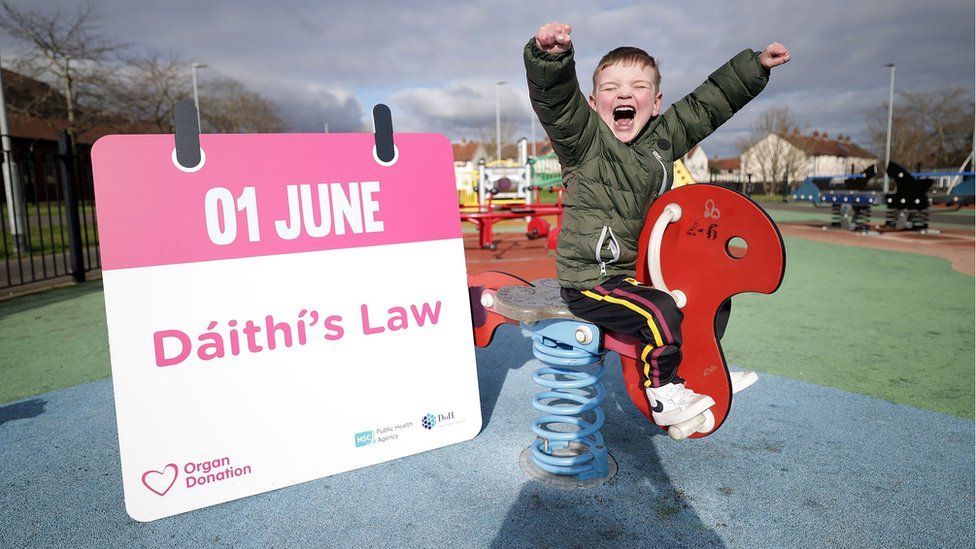ARTICLE AD BOX
 Image source, Department of Health
Image source, Department of Health
The new legislation means all adults in Northern Ireland are potential organ donors unless they opt-out or are in an excluded group
By Aileen Moynagh
BBC News NI
Most adults in Northern Ireland are now considered potential organ donors as Dáithí's Law has come into effect.
The legislation is named after six-year-old Dáithí Mac Gabhann, who needs a heart transplant.
The law was passed in February with the support of the UK government after it was delayed because of the political stalemate at Stormont.
Northern Ireland was the only part of the UK where an opt-out organ donation system was not in place.
The intent of the Organ and Tissue Donation (Deemed Consent) legislation, known as Dáithí's Law, is to increase the number of organs available to people in need of a transplant.
The new legislation changes the way consent is granted.
Now adults in Northern Ireland are deemed to have given consent as a potential organ donor after their death unless they choose to opt-out or are in an excluded group.
Those excluded from deemed consent legislation are:
- children under 18
- people who lack the mental capacity to understand the change in law
- visitors to Northern Ireland and temporary residents
Department of Health permanent secretary Peter May said that even though the law surrounding organ donation had changed, everyone would still have a choice.
He said there had already been "increased awareness, discussion and support for organ donation during the law change process".
Image source, PA Media
Image caption,Dáithí Mac Gabhann and his family led the campaign for the change to organ donation law
"We know that the vast majority of people here say that they support organ donation in principle but many people still haven't got round to signing the NHS Organ Donor Register or telling their families," said Mr May.
"By switching to an opt out system the hope is that this makes it easier for families to support donation."
A precious gift
Dr Dominic Trainor, the clinical lead for organ donation in Northern Ireland, said: "It is only in the unfortunate situation where a person has died in hospital, in specific circumstances, that organ donation is considered.
"As these numbers are very small, organ donation is, and will always be, a precious gift."
Last year in Northern Ireland 96 patients received a life-saving transplant from a deceased donor and Northern Ireland had 59 donors who enabled 140 life-saving transplants across the UK.
Ten to 15 patients die each year in Northern Ireland while awaiting a transplant.
Dáithí Mac Gabhann has been on the waiting list for a heart transplant since 1 June 2018.
During that time his family have worked tirelessly to campaign for a move towards soft opt-out law and to promote organ donation.
Sean Brown received a kidney from an organ donor more than 30 years ago
Organ donation means people like Sean Brown, who had kidney failure when he was eight years old, had a second chance at life.
He received a kidney in December 1989 and, although his body initially rejected it, almost 34 years later it is still going strong.
"Just receiving a kidney was really good - at that time I had no real quality of life," he said.
"My kidneys just failed and they've never understood why."
Getting a kidney transplant means Sean was able to lead a normal life.
He feels very thankful to the man who donated him his kidney after he died and he said he believed that Dáithí's Law was important.
"There are people out there who need organs and this is a way of hopefully increasing the supply of organs that people can get the gift of life that I did," he said.
'It was the sort of person she was'
Behind every organ donation is a person who has given the gift of an organ after their death.
Clare McFaul from Larne, County Antrim, was 32 when she died after collapsing at home after a zumba workout.
Image source, Clare McFaul
Image caption,Donating her organs was something Clare McFaul would have wanted, says her sister
She had an undetected brain arteriovenous malformation.
Her sister Ciara Hunter said her family had been asked at the hospital whether Clare would want to donate her organs.
Clare was not on the donor register, which surprised Ciara.
"We were fortunate in the fact that Clare was that sort of person that she would have," said Ciara.
"She would have literally given you the shirt of her back."
Ciara said that once the reality set in that Clare was gone, it was straightforward for her family to agree to donate her organs.
"The harder things were deciding about her eyes or her heart," said Ciara.
Ciara Hunter, whose sister Clare died suddenly, says the new law will make a big difference
"Things that I know can give people new lives, but there is a sentimentality.
"If somebody said to you: 'You have your mother's eyes', the thought of somebody else then having those eyes is very, very difficult."
Ciara said it had helped knowing that there were people who were now "still out, about and kicking and getting on and living their lives because Clare was the sort of person who would do that".
Ciara described Dáithí's Law as brilliant and one that was "going to make a difference to so many lives".
She believed her sister's story had helped in talking about organ donation.
"She would be really, really happy to know that her tragedy, what happened to her, has sparked the conversation in so many homes to make the difference to so many people," she said.

 2 years ago
43
2 years ago
43








 English (US) ·
English (US) ·